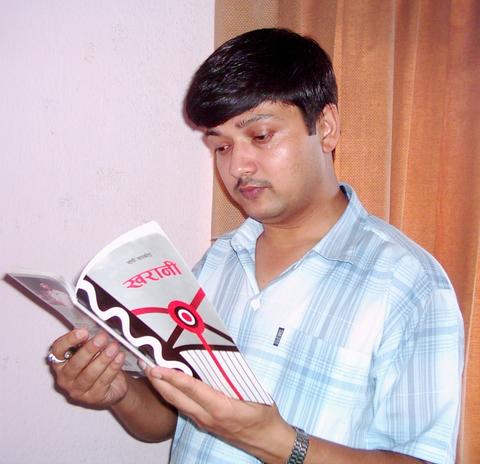Gopal Parajuli, a prominent writer of Nepal, always seeks for new dimension in writing to create his identity as an experimentalist. He loves to play with words, thoughts and feelings to experiment. He is fond of shaping new form in his latest writing. Sabda Satabdi (The Century of Word) is also an experimental work of art by Mr. Parajuli. Sabda Satabdi has been divided into two parts – Satabdi Purush and Sabda Purush.
The Satabdi Purush, a man of century submits the proposal where as the Sabda Purush, the man of word inaugurates the proposal. These proposals are in the forms of poetry. There are 36 poems under the section Prastav Jaher (Submission of Proposal) in Satabdi Purush and 38 poems in Prastav Udghatan (Inauguration of proposal) that falls under the category of Sabda Purush. The Satabdi Purush, the man of century has been talking about the current problems through the poems. The war lovers are attracting all towards their own thought in the country of Buddha. The truth is in emergency. The power holders are in love of war. The war has been waged for power. Though all the views advocated through the poems are of the poet Parajuli, he states his own view about his poetry in the foreword. He explicates – 'the world can’t be empty by murdering few people – those who stand against of peace should know clearly’. Poet Parujuli is a peace lover. He knows that the peace is in crisis at present. This situation haunts him. He composes-
The savers have started to tell lie
The enemies have started to conspire
Against the country. (Proposal 4)
'Time has already exited from the boundary of definition.' Poet Parajuli further talks in relation to time, space and poems. 'Poetry can’t go out from words, neither it can go out from life. It can’t go out from the emotions. It can’t go out from the expression of feelings. There is no space for poetry out of human being.' Gopal Parajuli believes that for poetry the existence of human beings is important. The whole country has deepened in despair. People are eagerly waiting for the ray of hope. A continuous waiting for the fortune! We can clearly see the chauvinistic feelings of the poet overwhelming in his heart. He loves the people, the country. He writes: People are waiting to listen, who brings the new news for country? (Proposal 4). Science has been networking violence and murder through internet through email (Proposal 32)
The second part of the book is of Sabda Purush, the man of word. So, there is no need to worry with the submission of frustrating proposals, the man of word has powerfully come out with forceful inaugurations. The man of the word spells out -
To save the life,
I declared myself
as a first police of the life.
(Inauguration 1)
These voices show the hopes for resolving the problems. But these expressions seem funny. The stanza like declaring himself a first police to save his own life shows the people's attitudes of individuality. It may also reflect that if one is saving oneself means everybody is saving him/herself. So, there requires not the security forces. It's a perfect stage of life that Mr. Parajuli has dreamt of. Gopal Parajuli always hopes for better. He expects the God, waits for Him. Though he himself does not know, whether the God exists or not, he wishes a friend who brings him the God in the world of love. Meanwhile he also suspects whether the enemies will come. But his desire of God's arrival seems strong. He states:
In my love
if the enemies do not come
a friend will come with the God.
(Inauguration 6)
Sometimes, the heart bursts out vigorously. The inner power becomes so strong that anything won't be impossible.
The poet's expression:
I will seize the gun from present
and will change the scene
at least for a moment
(Inauguration 19)
Changing the scene for a moment is not enough as well as is not what the people have expected. If it is to be changed, it should be changed completely, that's what the poet has not expressed. So, these expressions seem absurd, in complete. May be he urges others to fill up what he has left as gaps? The form of absurdity has been seen in the dramas in most of the cases, where as Gopal Parajuli utilizes the absurd form of writing not only in his dramas rather chooses to experiment in his poems and short stories. When the life and society are entangled confusingly in the abyss of absurdity, how a write can escape himself from the abyss, that compels him to express his opinions in absurd way. This is what poet Parajuli has been experiencing and expressing. The divergence in subject matter and stylistic novelty reflect his originality in writing. His experimental nature always encourages him to exercise with the philosophies of existentialism and absurdity.
Gopal Parajuli emphasizes more in the form rather than the content of his works of art. Searching, identifying and presenting ideas through new forms of expression has helped poet Parajuli glitter among the other nepali writers.
 · This is my fifth book. I have chosen two genres to express myself that are drama and poetry. As poetry, this is my second book, and it has come after more than one decade. Some 11 years back, my poetry book was published. The Death in a Rose Ashtray is an anthology of the selected poems written in last one decade.
· This is my fifth book. I have chosen two genres to express myself that are drama and poetry. As poetry, this is my second book, and it has come after more than one decade. Some 11 years back, my poetry book was published. The Death in a Rose Ashtray is an anthology of the selected poems written in last one decade.